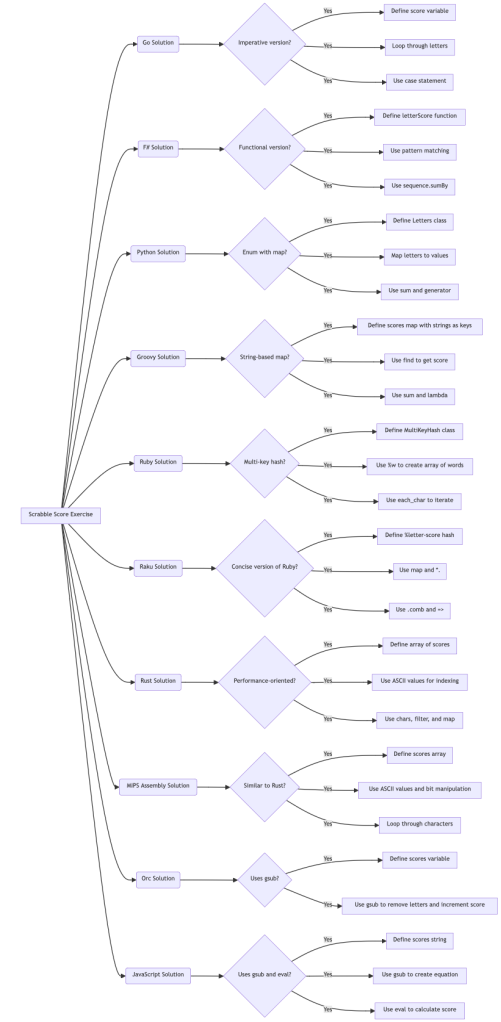Introduction
This post uses different prompts from Large Language Models (LLMs) to uncover the concealed, provocative, and propagandistic messages in the transcript of the program “10 ways to solve Scrabble Score on Exercism” by the YouTube channel Exercism.
In that program Alex and Eric explore various ways to solve the Scrabble Score programming exercise in multiple languages, including Go, F#, Python, Groovy, Ruby, Raku, Rust, MIPS assembly, and Orc. They discuss the efficiency and readability of different approaches, highlighting functional programming, pattern matching, and performance optimization techniques.

Remark: The “main” summarization prompts used are “ExtractingArticleWisdom” and “FindPropagandaMessage” .
Remark: The content of this post was generated with the computational Markdown file “LLM-content-breakdown-template.md”, which was executed (or woven) by the CLI script file-code-chunks-eval of “Text::CodeProcessing”.
Post’s structure:
- Themes
Instead of a summary. - Flowchart
For programmers to look at. - Habits and recommendations
Didactic POV. - Hidden and propaganda messages
The main course.
Themes
Instead of a summary consider this table of themes:
| theme | content |
|---|---|
| Introduction | Eric and the speaker introduce the Scrabble score exercise, where points are calculated based on letter values in a word. |
| Go Solution | A basic Go implementation with a loop and case statements to increment the score based on letter values. |
| F# Solution | A functional approach in F# using pattern matching and higher-order functions like ‘sumBy’ for conciseness. |
| Python Solution | Python solution using an Enum class to define letter-score mappings and a generator expression for efficient summing. |
| Groovy Solution | Groovy implementation with a string-based map and a lambda function to find the score for each character. |
| Ruby Solution | A Ruby solution using a custom ‘MultiKeyHash’ class to enable indexing by character while maintaining string-based definitions. |
| Raku Solution | A concise Raku (Perl 6) version using the ‘map’ and ‘sum’ methods and a special operator for pairwise mapping. |
| Rust Solution | A performance-oriented Rust solution using an array for efficient lookups based on character indices. |
| MIPS Assembly Solution | MIPS assembly implementation with a loop, character comparisons, and a bitwise OR trick for lowercase conversion. |
| Orc Solution | An Orc solution using regular expressions and the ‘gsub’ function to count and sum letter occurrences. |
| Perl Solution | A Perl solution with regular expression replacements to create an equation and ‘eval’ to calculate the score. |
| Conclusion | The speakers encourage viewers to try the exercise, explore performance optimizations, and share their solutions. |
Flowchart
Here is a flowchart summarizing the text:

Habits and recommendations
HABITS
- Breaking down problems into smaller, more manageable functions for better organization and readability.
- Using meaningful variable and function names to enhance code clarity.
- Considering performance implications of different approaches and choosing appropriate data structures and algorithms.
- Testing code thoroughly to ensure correctness and handle edge cases.
- Seeking feedback from other programmers to gain different perspectives and improve code quality.
- Exploring different programming languages and paradigms to broaden your skillset and understanding.
- Practicing regularly to hone your coding skills and experiment with new techniques.
- Staying up-to-date with the latest advancements in programming languages and technologies.
- Engaging with the programming community to learn from others and share your knowledge.
RECOMMENDATIONS
- Try the Scrabble Score exercise in different programming languages to explore various approaches and language features.
- Experiment with functional programming techniques like higher-order functions and pattern matching for concise and expressive code.
- Consider performance implications when choosing data structures and algorithms, especially for large-scale applications.
- Utilize regular expressions for efficient string manipulation and pattern matching tasks.
- Engage with the programming community to learn from others, share your knowledge, and get feedback on your code.
- Continuously learn and explore new programming languages and technologies to expand your skillset and stay current in the field.
- Benchmark different solutions to evaluate their performance and identify areas for optimization.
- Prioritize code readability and maintainability to ensure long-term project success.
- Don’t be afraid to experiment with creative and unconventional solutions to programming challenges.
Hidden and propaganda messages
OVERT MESSAGE
Two programmers are discussing different ways to solve a programming challenge involving calculating the score of a word as in the game Scrabble.
HIDDEN MESSAGE
Technology and programming are fun and interesting pursuits that are accessible to people from a variety of backgrounds and skill levels.
HIDDEN OPINIONS
- Programming is a valuable skill to learn.
- There are many different programming languages available, each with its strengths and weaknesses.
- It is important to choose the right tool for the job when programming.
- Functional programming can be a powerful tool for solving problems.
- Performance is an important consideration when programming.
- Code readability is important for maintainability.
- It is important to test code to ensure it is working correctly.
- Collaboration can help improve the quality of code.
- It is important to be open to learning new things and experimenting with different approaches.
- The programming community is a valuable resource for learning and support.
SUPPORTING ARGUMENTS and QUOTES
- The video discusses different programming languages, including Go, F#, Python, Ruby, Raku, Rust, MIPS assembly, and Orc. This suggests that the speakers believe there are many different ways to approach programming and that it is valuable to be familiar with a variety of languages.
- The speakers discuss the trade-offs between different approaches, such as performance vs. readability. This suggests they believe that it is important to consider different factors when choosing how to solve a problem.
- The speakers encourage viewers to try the challenge themselves and share their solutions. This suggests that they believe that programming is a fun and rewarding activity that can be enjoyed by people of all skill levels.
- “Scrabble score is such a limited domain, but if you were to try to optimize this, move the upper casing U to the left so that you don’t have to do it within the loop.”
- This quote suggests that the speakers believe that performance is an important consideration when programming, even for small tasks.
- “I always think through things like this if you’ve got like some program where you’re trying to calculate the Scrabble score for every word in the whole English dictionary then actually performance starts to matter because you’re running this you know millions of times how many words I not Millions but a lot of times anyway um and yeah so it’s a trade-off between if you’re just running this in a normal game it probably doesn’t matter but if you’re trying to build an online Scrabble game that’s going to have a million people simultaneously playing it this sort of performance actually matters because this is going to be costing you money as you have have to have more servers running to do more things in parallel so um yeah always tradeoffs to consider with uh with speed”
- This quote suggests that the speakers believe that it is important to consider the context in which code will be used when making decisions about how to write it.
- “I had to look at once once you see it once you get it it’s really nice like it’s a really clever way of doing it”
- This quote suggests that the speakers believe that programming can be challenging but also rewarding, and that it is important to be persistent when learning new things.
DESIRED AUDIENCE OPINION CHANGE
- Programming is an enjoyable and rewarding activity.
- Learning to code is accessible and achievable for anyone.
- Different programming languages offer unique approaches to problem-solving.
- Exploring various programming techniques expands your skillset.
- Performance optimization is crucial in real-world applications.
- Readable code is essential for collaboration and maintainability.
- Testing and debugging are integral parts of the programming process.
- The programming community fosters learning and collaboration.
- Continuous learning and experimentation are key to growth as a programmer.
- Programming skills are valuable in today’s technology-driven world.
DESIRED AUDIENCE ACTION CHANGE
- Try the Scrabble score programming challenge.
- Explore different programming languages and paradigms.
- Share your programming solutions and learn from others.
- Engage with the programming community and seek support.
- Consider performance implications when writing code.
- Prioritize code readability and maintainability.
- Implement testing and debugging practices in your workflow.
- Embrace continuous learning and experimentation in programming.
- Apply programming skills to solve real-world problems.
- Consider a career path in the technology industry.
MESSAGES
The programmers want you to believe they are simply discussing solutions to a programming challenge, but they are actually promoting the idea that programming is a fun, accessible, and rewarding activity with diverse applications.
PERCEPTIONS
The programmers want you to believe they are technical experts, but they are actually enthusiastic advocates for programming education and community engagement.
PROPAGANDA ANALYSIS 0
The video subtly employs propaganda techniques to shape viewers’ perceptions of programming. By showcasing diverse solutions and emphasizing the enjoyment and accessibility of coding, the programmers aim to integrate viewers into the technological society and promote its values. The video avoids overt persuasion, instead relying on the inherent appeal of problem-solving and the allure of technical expertise to subtly influence viewers’ attitudes towards programming.
PROPAGANDA ANALYSIS 1
The video leverages the power of social proof and expert authority to promote programming. By featuring multiple programmers and highlighting their ingenuity and problem-solving skills, the video aims to create a sense of community and inspire viewers to participate. The emphasis on the accessibility and enjoyment of coding aligns with Bernays’ concept of associating desired behaviors with positive emotions and social acceptance.
For the masses
Here is an image to get attention to this post (generated with DALL-E 3 and additionally tweaked):

The LLM results are generated from the transcript provided by YouTube/Google’s software. The software can sometimes struggle to accurately parse uncommon names and accents that are not standard, although it generally performs well. This is why we have the “Orc” language in the post.
LikeLike